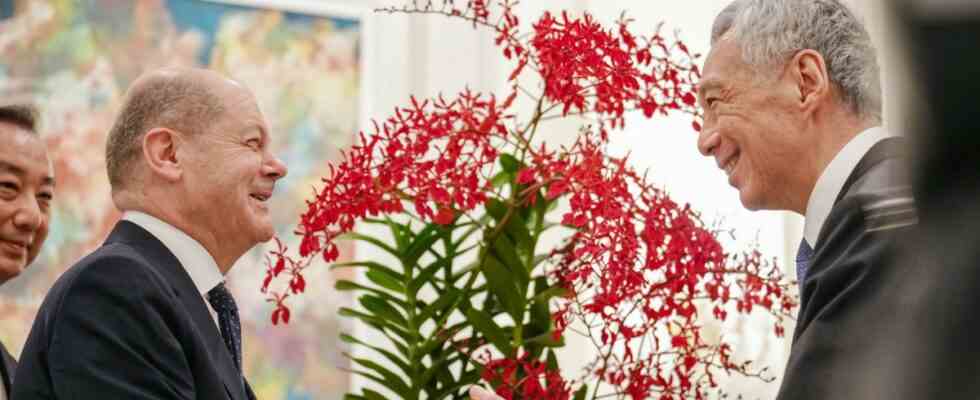If nothing else remained from this short visit, at least Renanthera Olaf Scholz. As is Singaporean custom, an orchid is named after the distinguished guest. “I didn’t become a politician so that a plant would be named after me, to be honest, but I still feel honored,” says the Federal Chancellor, who may not take the red flower with him on his trip, but a certificate which takes him on to Bali for the G-20 summit.
It should be far less harmonious there. Scholz is “cautiously confident” that the summit will “form an opinion” that makes it clear that international rules must be observed and that “law comes before might”. The optimism seems at least daring, because the G-20 countries are deeply divided in their reaction to the Russian war of aggression against Ukraine.
“Russia’s brutal war against Ukraine may be geographically far away, but its consequences – hunger, energy shortages, inflation – are global. This war endangers our peaceful order and the idea of a world built on common rules,” says Scholz during his stopover in Singapore. That’s why it’s so important “not to let Putin get away with his imperialist goals.” Scholz does not have to convince his host, Prime Minister Lee Hsien Loong, of this. Singapore was “clear and unequivocal” in its condemnation of the Russian war of aggression, he assured during a joint press conference.
Singapore has joined Western sanctions against Russia, making it a major exception in Southeast Asia, where Russia is in demand not least as an arms supplier. In Vietnam, the first stop on his trip to Asia, Scholz did not hear any public criticism of Russia. Singapore’s support shows “that a partnership based on values and principles is not an empty formula,” praised the Chancellor. “What applies to Europe in relation to Ukraine also applies to Asia, Africa or Latin America. No country is the backyard of another,” he says. In essence, this is the argument that Scholz also wants to bring up in Bali.
The Chancellor finds it regrettable that Russia’s President Vladimir Putin is not coming to the summit and is being represented by Foreign Minister Sergei Lavrov. “But then he would have had to face all the questions and all the criticism that has been formulated by many countries around the world. That’s probably why he’s not there,” says Scholz. The chancellor considered it a great success that the Chinese head of state, Xi Jinping, joined his warnings against Russian nuclear threats in the Ukraine war during his first visit to Beijing. The Chancellor would like the G-20 summit to send out a similar message. But he doesn’t want to sound too optimistic in this regard. “It will be,” he says, “another tough ride.”

